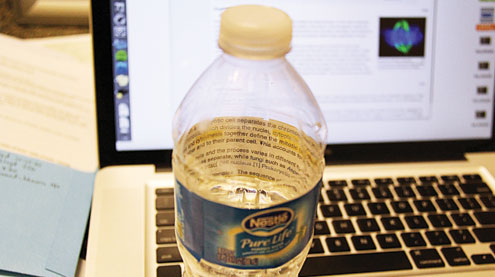With more sophisticated devices, students everywhere have the opportunity to perform acts of academic misconduct in ways that were not possible in years prior to this generation.
Although it appears students may be cheating more, the truth is, it just seems more obvious.
The University is making a push to involve students in a move for academic integrity by creating councils in each college to allow students to be involved with actions of academic misconduct.
“We currently have nine councils,” said Mark Nelson, vice president of Student Affairs. “The chief justice of each council is part of the University-wide council, which promotes academic integrity by students.”
A story written by USA Today focuses on how students now have the technology to digitally insert answers into the labels of soft drinks and also text photos of exams to each other.
“It is the student’s choice to cheat, and it is my responsibility to report it to the academic dean when it happens,” said art history professor Jenny Blount Tucker.
Modern forms of cheating have made it harder for teachers to detect whether a student in their class is cheating or not. Many students in classes now have laptops, iPods and other forms of technology that are necessary for the class, so for teachers, the possibility of catching students is lower because of the necessity for that piece of technology in the class.
“Cheating on exams is a rare situation,” said Richard Folding, chair of the political science department. “The most popular form of academic misconduct is plagiarism, when students collaborate on an assignment that should be done individually, or students use another person’s paper, or the students don’t reference a source properly.”
Professors are now implementing strategies to make it more difficult for students to find ways to commit academic misconduct.
Their policies on electronics in class are strict to reduce the possibility of cheating, which includes students not being able to have any electronics on during the class to keep others from being distracted and to aid in their ability to pick on cheating in an easier way.
“The general strategy we try to use is to create written assignments that are difficult to plagiarize and are specific to the topic and/or class,” Fording said.
In the Culverhouse College of Commerce and Business Administration, professors are seeing more students use technology to aid in their academic misconduct.
“The main form that we see is the misuse of electronic media,” said Robert McLeod, professor of finance and academic misconduct monitor. “A student with a cellphone and a camera on it can take pictures of exams and send them to other students who have the same class but a different section.”
“Alabama is ahead of the curve concerning misconduct because we are getting the students involved,” Nelson said. “Academic misconduct mostly occurs when well-intentioned students put themselves in situations by procrastination where they feel the misconduct is necessary.”









